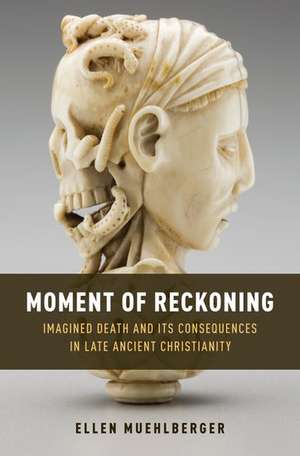Moment of Reckoning: Imagined Death and Its Consequences in Late Ancient Christianity
Autor Ellen Muehlbergeren Limba Engleză Hardback – 6 iun 2019
Preț: 545.41 lei
Preț vechi: 782.02 lei
-30% Nou
Puncte Express: 818
Preț estimativ în valută:
104.37€ • 108.31$ • 87.24£
104.37€ • 108.31$ • 87.24£
Carte disponibilă
Livrare economică 11-17 februarie
Preluare comenzi: 021 569.72.76
Specificații
ISBN-13: 9780190459161
ISBN-10: 0190459166
Pagini: 264
Dimensiuni: 239 x 155 x 31 mm
Greutate: 0.5 kg
Editura: Oxford University Press
Colecția OUP USA
Locul publicării:New York, United States
ISBN-10: 0190459166
Pagini: 264
Dimensiuni: 239 x 155 x 31 mm
Greutate: 0.5 kg
Editura: Oxford University Press
Colecția OUP USA
Locul publicării:New York, United States
Recenzii
This study opens new and frequently challenging ways of seeing late antique Christianity as cultural, ideological, and subjective formation, and should provide rich fodder for further conversations.
The author's retrieval opens the door to further reflection in a number of ways- historical, textual, and in formulating concepts and practices of religion.
This methodologically sophisticated, lucidly written book will be important reading for advanced students of early Christianity.
A stimulating contribution to the study of Christian cultural transformations in late antiquity.
Moment of Reckoningis an elegant and accessible book, which looks afresh at a cluster of ideas too easily taken for granted as basic to a Christian worldview. As an aside, it also has some of the most effective use of the first person I have seen in scholarly work. ... Like the late ancient Christian texts it so neatly analyses, Moment of Reckoning will encourage its readers to pay much more attention to expectations of death.
This brilliant, elegant, accessible, and important book brings into focus for the first time the part that the moment of death played in the imagination of late ancient Christians. In elucidating how explanations of that moment were indebted to ancient rhetorical technologies and concepts of the body as the locus of punishment, Muehlberger illuminates the role that imagining death played in forming a culture of coercion in Late Antiquity.
With Moment of Reckoning, Ellen Muehlberger has given us an enormously important addition to a rapidly expanding field. By analyzing the changing ways in which late ancient Christians imagined their death and thus an ideal (or not so ideal) future, Muehlberger traces shifting notions of who should belong to the Christian community and why; for example, it was beneficial to force others to join that community for the sake of their post-mortem future. A stunning achievement.
Death took a turn in late antiquity: beginning in the fourth century, Christians under the tutelage of their rhetorically sophisticated leaders visualized death as a new phase of their moral lives. In this lively and sensitive study, Muehlberger traces the roots and far-ranging implications of this deathly turn. Moment of Reckoning transforms our understanding of early Christian personhood and cautions nuance in the stories we tell about the past.
The author's retrieval opens the door to further reflection in a number of ways- historical, textual, and in formulating concepts and practices of religion.
This methodologically sophisticated, lucidly written book will be important reading for advanced students of early Christianity.
A stimulating contribution to the study of Christian cultural transformations in late antiquity.
Moment of Reckoningis an elegant and accessible book, which looks afresh at a cluster of ideas too easily taken for granted as basic to a Christian worldview. As an aside, it also has some of the most effective use of the first person I have seen in scholarly work. ... Like the late ancient Christian texts it so neatly analyses, Moment of Reckoning will encourage its readers to pay much more attention to expectations of death.
This brilliant, elegant, accessible, and important book brings into focus for the first time the part that the moment of death played in the imagination of late ancient Christians. In elucidating how explanations of that moment were indebted to ancient rhetorical technologies and concepts of the body as the locus of punishment, Muehlberger illuminates the role that imagining death played in forming a culture of coercion in Late Antiquity.
With Moment of Reckoning, Ellen Muehlberger has given us an enormously important addition to a rapidly expanding field. By analyzing the changing ways in which late ancient Christians imagined their death and thus an ideal (or not so ideal) future, Muehlberger traces shifting notions of who should belong to the Christian community and why; for example, it was beneficial to force others to join that community for the sake of their post-mortem future. A stunning achievement.
Death took a turn in late antiquity: beginning in the fourth century, Christians under the tutelage of their rhetorically sophisticated leaders visualized death as a new phase of their moral lives. In this lively and sensitive study, Muehlberger traces the roots and far-ranging implications of this deathly turn. Moment of Reckoning transforms our understanding of early Christian personhood and cautions nuance in the stories we tell about the past.
Notă biografică
Ellen Muehlberger is Associate Professor of Christianity in Late Antiquity in the Departments of Near Eastern Studies and History at the University of Michigan. During the research for this book, she held of the Charles A. Ryskamp Research Fellowship (2014-15) and a National Endowment for the Humanities Fellowship (2016-17).
